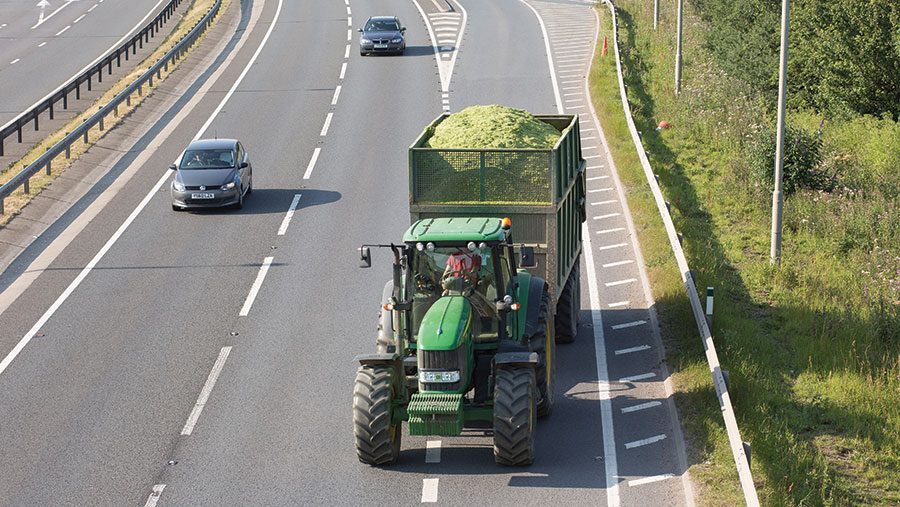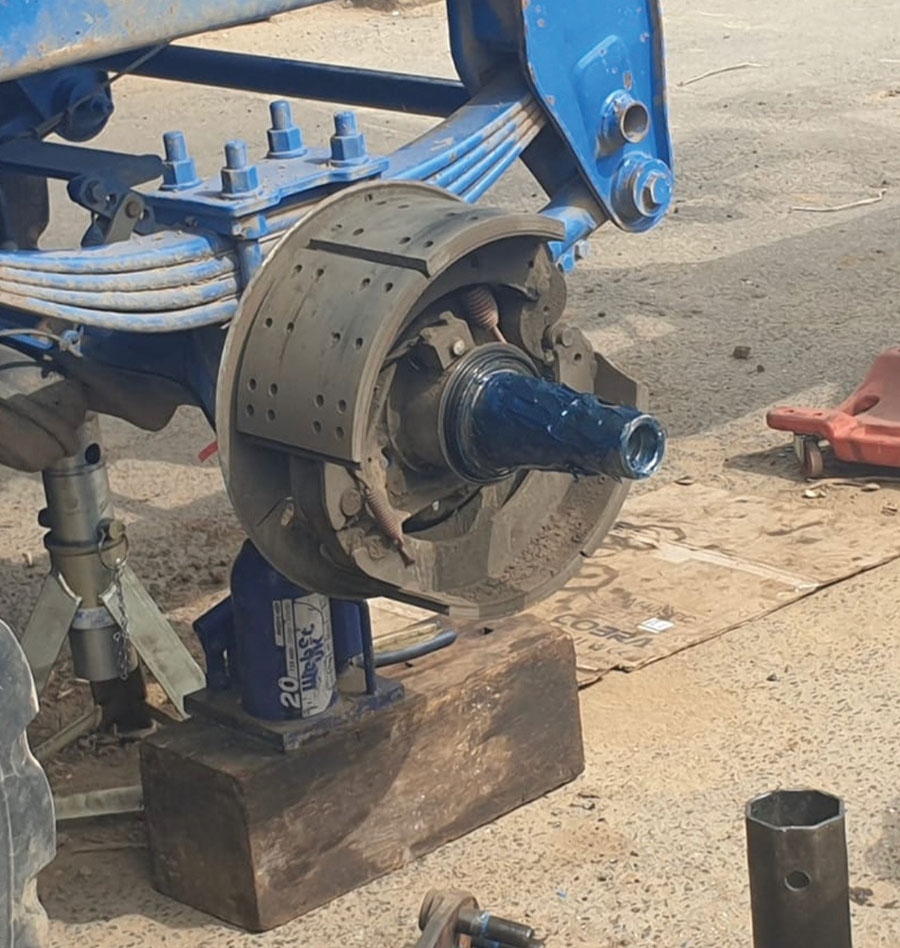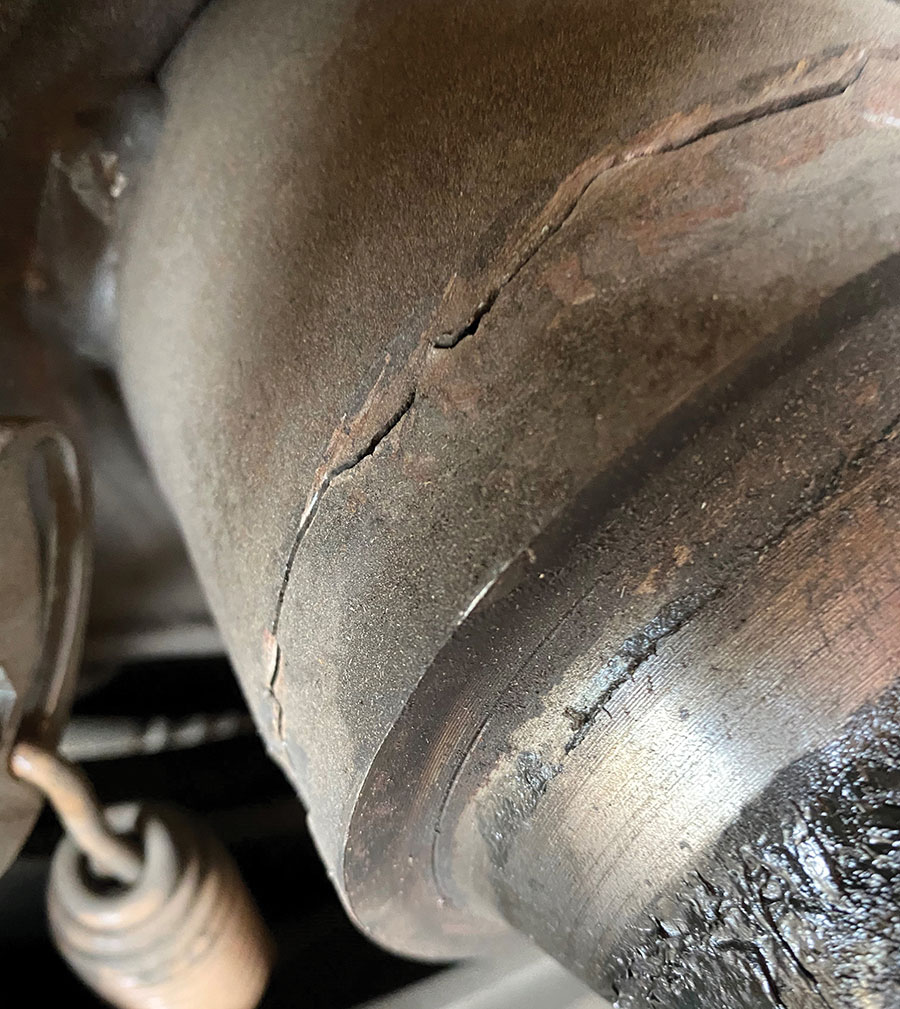Shocking farm trailer inspection data raises safety concerns
 © Tim Scrivener
© Tim Scrivener Agricultural trailers must be safe and properly maintained to avoid dangerous and costly accidents. But out of 1,000 trailers inspected by Tilly Pass in 2019, 84% had a serious brake defect and 58% needed worn wheel bearings replacing.
More than 100 of the trailers had dangerously worn towing eyes. Analysis by Tilly Pass found that a towing eye will wear by at least 3mm each year, which increases the risk of the trailer detaching from the tractor.
See also: In photos: Simple checks to keep farm trailers safe
When the trailers were retested in 2020, more than 110 were found to have worn towing eyes and in 2021, this increased to 160.
Nearly 65% of the trailers retested in 2020 had a serious break defect, but this dropped to 48% in 2021.
Jane Gurney, founder of the Tilly Your Trailer campaign, says farm trailers must be professionally maintained, but an alarming number are on the roads with defects that could prove lethal.

A trailer stripped down during inspection © Tilly Pass
“Tipping the balance of 84% or 47% for the repeat checks isn’t enough, people are still turning a blind eye,” she says.
“Nothing should take precedence over safety. What you have on the back is a loaded gun waiting to go off, and it might be you or it might be the person coming the other way that gets the brunt of it.”
Ms Gurney’s son, Harry Christian-Allan, was killed in 2014 after faulty brakes on the trailer he was towing caused him to crash.
Police view from the road
Getting a Tilly Pass is a “sure-fire way to know your trailer is safe for the roads”, says Norfolk Police roads policing officer Mike Stolworthy.
PC Stolworthy patrols the county to identify offences and offer education or enforcement, as well as deal with serious and fatal collisions.
“The main reason for stopping farm trailers has been around load security, as this is most visible when driving along,” he says.
“However, from these stops other offences do often arise from a trailer safety point of view. We have found tyres that are damaged, with large slices, cracks, cuts and some even worn to below minimum tread.
“We have also found lighting not working, beds of trailers which have disintegrated over time, towing eyes worn below the minimum, handbrakes not working and damaged brake lines.
“These faults vary, but it is likely we will find at least one offence on a trailer at each stop we make.”
PC Stolworthy says the Tilly Pass inspection offers farmers and the police some peace of mind, but anyone towing a trailer should carry out daily checks and report any faults.
“Should a vehicle be involved in a serious collision, we will look to seize it and examine it. This could have a big effect on your ability to perform harvest, so please get it right,” he advises.
“Should the worst happen and that trailer be involved in a fatal collision, if it isn’t safe and found to have contributed to the incident, the driver could be looking at a prosecution for causing death by dangerous driving.
“Taking it down the scale for a bit, for the sake of a walk-around check on the trailer by the driver, you could avoid points, fines and even disqualifications.”
Hidden defects
“We know that many trailers involved in fatal incidents, including my son’s, had a number of hidden defects,” she says.
“If you are looking at a trailer and you can see there are a couple of visual faults, maybe the towing eye and a broken handbrake cable, which is very common, then there is likely a lot more wrong that you can’t see. Hidden defects on trailers are a great concern.”
Agricultural trailers are legally required under the 1998 Provision and Use of Work Equipment Regulations to be in a roadworthy condition, which means they should be well maintained and in good working order, with records of maintenance held by the farmer.

Cracked axel © Tilly Pass
The Tilly Pass offers the opportunity for trailers to be maintained to the legal standard. An annual 18-point inspection is carried out on farm by authorised mechanics.
The inspection covers lights, tyres, towing eye, all brakes, hydraulic pipes and connectors, tailgate and the trailer’s structure – to check for cracks or holes.
Once a trailer has passed, a Tilly certificate will be fixed to the tailgate, clearly displaying a unique Tilly Pass number. This will be recorded along with the trailer chassis number for a thorough record of maintenance.
Regular maintenance is good practice for employers, says HSE
The Health and Safety Executive (HSE) says every employer has a legal duty to ensure that their work equipment is maintained in an efficient state, and is in good working order and a good state of repair.
“Equipment must be maintained so that its performance does not deteriorate to the extent that people are put at risk,” an HSE spokesperson said.
“We work closely with agricultural stakeholders to communicate the message that not only must work equipment be maintained in this way in order to comply with the law, but also that it is good practice that can serve to benefit other business objectives such as improved productivity and a reduced environmental impact.”
The HSE says the frequency and nature of maintenance should be determined by a suitable and sufficient risk assessment which takes into account: manufacturer recommendations for maintenance, intensity of use, operating environment, user knowledge/experience and the risk to health and safety from any foreseeable failure or malfunction.
Tireless campaigner
Ms Gurney has been campaigning tirelessly to encourage all farmers, contractors and agri-businesses to put each trailer they use through a rigorous annual inspection under the Tilly Pass.
“I don’t expect an inspection sheet to come across my desk that shows nothing wrong with the trailer,” she says.
“I’m disappointed that we are seeing so many trailers that are potentially lethal. I’m also disappointed that people fight against something that is so simple to get help with.
“Any one of these trailers could take somebody’s life. You have to consider how lucky we are at the moment to tip the balance with the trailers we are doing, but that isn’t going to sustain the situation. People have to engage with it.”
A network of qualified mechanics carry out the Tilly inspections across the country. Ms Gurney says there are pockets of non-engagement everywhere, but there is “a lot of work to do” in the West Country, Lincolnshire, Norfolk and Essex.
“You are absolutely within your rights to ask to see the paperwork for the maintenance of a trailer, and you should be asking,” she says. “Unqualified work is dangerous, someone has to measure your competence.”
NFU Mutual backing
Rural insurer NFU Mutual supports the Tilly Pass initiative and recommends farmers use the service to keep their trailers in a safe condition.
Its farm insurance specialist, David Harrison, says the alarming inspection data suggests there is more work needed to promote the importance of trailer safety.
“What concerns me is that these statistics come from the farmers who are being proactive; the ones who are putting their trailers forward for tests,” he says. “What about the rest of the trailers out there?
“We think it is an important area that needs more focus – the stats for farm fatalities are horrendous. There is still work for us to collaborate on across the industry, whether that is the unions, ourselves as the main rural insurer and initiatives such as Tilly Pass.”
The year is a good time for farmers and contractors to service each trailer, he adds.
“There is a larger cost if you are a bigger farm business with eight to 10 trailers, but there is no point inspecting one or two and deciding to not test one that might be there as a backup. What happens if you need to bring that reserve trailer into use? For trailers left out over winter, they don’t respond well. It is important they are looked after and maintained in line with the manufacturer’s guidance.
“In terms of the silaging and grain carting season, it is a quieter time of year, so it is a good time for farmers to be getting their trailers inspected before silaging and the main harvest starts.”

